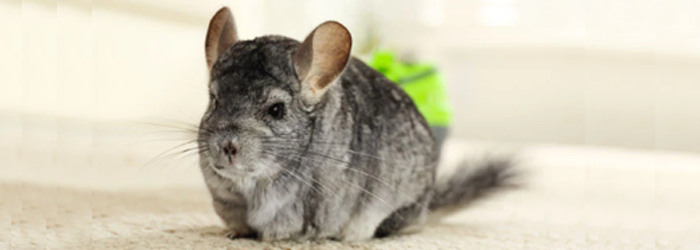What to Know Before Bringing Home a Chinchilla
Chinchillas are adorable, social and energetic animals, which makes them fun pets to have around. And keeping them around provides fun for both a good time and a long time, since they tend to live 10+ years. However, your chinchilla’s happy, healthy lifespan depends on the care and nutrition you provide as their caretaker. To raise your rodent well, there are a few things you should know. Keep reading to learn how you can best prepare for your chinchilla’s homecoming.
Get to Know Your Chinchilla’s Habits

Just like humans, chinchillas have their day-to-day preferences and routines. Prepare to support your pet accordingly to make your shared home is a happy and harmonious one.
Chinchillas are crepuscular animals, meaning they are full of energy at dawn and dusk. Mornings and evenings are great times for some quality play time while your pet is naturally awake and active.
Incorporate some toys and activities in your chinchilla’s environment to allow them to jump, run and explore on their own. Metal exercise wheels, tunnels and ladders can stimulate curiosity and entertain your furry friend for hours.
Make Your Chinchilla’s Habitat a Home
For all their running, jumping, climbing and exploring, these rodents require plenty of space. Chinchillas are native to the Andes Mountains in South America, so spaces that are too small or don’t allow for ventilation can cause them distress. More is more when it comes to the size of your pet’s habitat!
When it comes to material environments, breathable wire-walled enclosures with a solid bottom work well for keeping your pet comfortably contained. Do not purchase a plastic habitat, as chinchilla teeth can easily chew right through them.
Keep their space clean, disinfecting surfaces weekly and changing bedding as needed. Shredded or paper bedding is best, since it tends to be more absorbent. Nonetheless, avoid leaving damp or soiled bedding to keep your pet’s safe space clean and dry.
Try your best to prevent your chinchilla from becoming wet at all, as their thick fur takes a long time to dry and can irritate skin underneath. A couple of dust baths each week help to keep chinchilla fur clean and oil free, so the only water your pet will need is for drinking.
Not only does dust make your chinchilla’s fur smooth and silky, but it is a relaxing and fun activity. Chinchillas love to roll, flip and play in the dust. Make sure to use store-bought chinchilla dust made specifically for this purpose and enjoy watching your pet mimic behaviors often seen in their native habitat!
Understand Your Chinchilla’s Dietary Needs
Gastrointestinal issues are fairly common for chinchillas. Proper nutrition is the best line of defense. Ingredients like the live probiotics and high-quality Timothy hay in Mazuri® Chinchilla Diet help support a healthy digestive system. This diet provides balanced nutrition you can count on and a sweet smell your chinchillas will love.
With a nutritionally balanced and complete diet, supplementation is unnecessary. However, chinchilla teeth grow continuously, so be sure to allow them access to safe wooden toys or mineral chews to gnaw on.
Chinchillas are a joy, but they aren’t for everyone. Read these tips from Mazuri PhD nutritionist Dr. Jen Parsons to find the pet that best fits your lifestyle!
